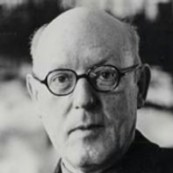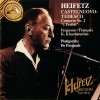Biography
Howard Ferguson (21 October 1908 – 31 October 1999) was a British composer and musicologist. He composed instrumental, chamber, orchestral and choral works. While his music is not widely-known today, his Piano Sonata in F Minor (Op. 8) and his Five Bagatelles for piano (Op. 9) are still performed. His works represent some of the most important 20th-century music to emerge from Northern Ireland.
Ferguson was born in Belfast. His musical talent was apparent early. The pianist Harold Samuel heard him in 1922 and encouraged his parents to allow him to travel to London to become his pupil. Following studies at Westminster School Ferguson entered the Royal College of Music in 1924 to study composition with R. O. Morris and Ralph Vaughan Williams. He also studied conducting with Malcolm Sargent, and formed a friendship with fellow-student Gerald Finzi.
His early compositions, such as his Octet of 1933 (scored for the same forces as Franz Schubert's octet), met with considerable success.
During World War II, Ferguson helped Myra Hess run the popular, morale-boosting series of concerts at the National Gallery. From 1948 to 1963 he taught at the Royal Academy of Music, his students there including Richard Rodney Bennett and Cornelius Cardew. He regarded Bennett as having an astonishing natural talent, though lacking a personal musical style.
After writing The Dream of the Rood in 1958-9, Ferguson simply gave up composing (saying that in his relatively few works he had 'said' all he wanted to say) in order to concentrate on musicology. His editions of early keyboard music and the complete piano sonatas of Schubert are authoritative.
In his later years he lived in Cambridge.
Ferguson's music has had many distinguished interpreters. These have included Myra Hess, who recorded the Piano Sonata in 1942, and Jascha Heifetz who recorded the first violin sonata in 1966. In addition,a live recording of Discovery, performed by Kathleen Ferrier and Ernest Lush in 1953, has been issued by Decca (475 6060).







![Great European Organs. 45-Roger Sayer [Hallgrímskirkja Reykjavík]](http://static.classicalm.com/repository/collection-cover/small/929-img1342001970694360.jpg)
